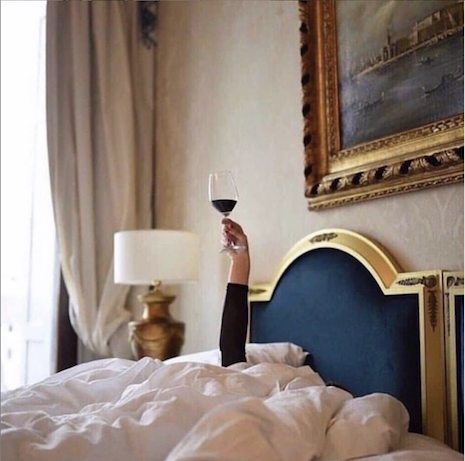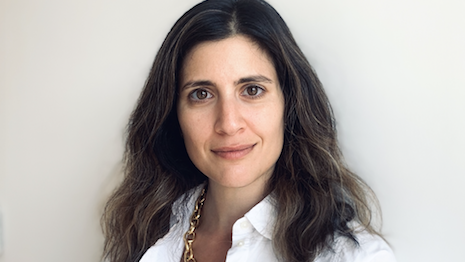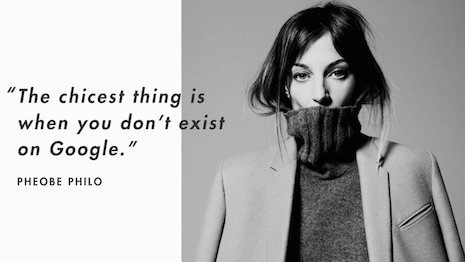By Nadia Tuma-Weldon
I once read that 90 percent of all human behavior can be attributed to signaling.
Simply put, “signaling” is the act by which a person conveys information about him or herself to another person or group of people.
In the context of what I write in these pages, I would add that this “information” is meant to communicate that the signaler is important and/or successful.
Logos are signaling. “It” bags are signaling. Luxury watches are signaling. Beachfront “current view” photos on Instagram are signaling. #grateful is signaling.
Signaling is not necessarily bad. It is critical to understand because it fuels and shapes our society, especially if that 90 percent number is true.
In a modern information economy, signaling accounts for much of how we behave, dress and speak in public, and subconsciously or not, says something about ourselves to colleagues, friends, even strangers on the street.
And while a good part of behavior can be explained by signaling, I tend to optimistically believe some things can still be done only for one’s own pleasure, away from public view.
Consider how, during his Bottega Veneta days, creative director Tomas Maier used “decadently soft and expensive suede for clutches and attaché cases, but conceal[ed] it within unremarkable-looking exteriors, as a lining that offers its owner a moment of stealthy self-pleasuring every time he or she reaches inside.”
Or the way the people at Cartier put the brand’s signature red bag inside an anonymous white one, allowing the customer to exit onto the rush of New York’s Fifth Avenue with the secret satisfaction of being the only one who knows the bag’s contents.
Maybe this is the purest form of luxury: to do something simply for one’s own pleasure, even – especially? – if no one is there to see it.
I believe this has never been more important than it is today: as the inequalities in society have been laid bare due to the coronavirus pandemic, it is essential to question our motivations for how we consume and understand luxury.
Recently, I have started to think that a new kind of signaling, a new type of luxury, could be simply to keep something to oneself and enjoy life privately.
In previous years, discretion in luxury has come and gone in accordance to the boom and bust of the economy.
Granted, there is a subset of the population that is wholly recession-proof and remains unseen from public view even in good times. There is a reason why brands such as Hermes enjoy success even in the worst of times.
The most recent example is, of course, the 2008 financial crisis, which sparked a wave of so-called “stealth wealth,” ushering in an era of discretion and privacy for those fortunate enough to afford it.
It was also during this time that Phoebe Philo’s Celine defined a new aesthetic of minimalist, subtly luxurious clothing women actually wanted to wear. Cool, comfortable and confident. In 2013, she casually uttered one of my favorite quotes of all time, prescient in her understanding of discretion: “The chicest thing is when you don’t exist on Google.”
When the Western world completely changed in March 2020, signaling – back to its pre-2008 publicity, having rebounded along with the economy – proved more difficult: we were not attending events, important work conferences, or traveling to far-flung exotic locations.
Nevertheless, signaling finds a way, even during the worst of the lockdown period. Remember Zoom happy hours? Thankfully, people stopped doing them and they were never spoken of again.
There was a moment when screenshots of, well, a screen, of people in small boxes peppered many an Instagram-story, conveying that the person was still a social creature, even in captivity.
Signaling during the lockdown period also included the books displayed in the background on video calls, the causes championed on social media, the new hobby/wellness activity/baking endeavor acquired during confinement.
Most of those signals tended to be relatively innocuous and championed by the “we’re all in this together” ethos, but anything resembling outward boasts of wealth and privilege were in poor taste.
One of biggest cultural differences between the 2008 crisis and that of today’s is that Instagram and its ilk did not exist yet – think about that for a moment. It has become a near knee-jerk reaction to upload anything resembling a signal to one’s followers, and takes some discipline to discern whether that is wise to do.
For example, married friends of ours who are fortunate to have considerable wealth, still enjoy the good life, but have agreed that they will not share photos of any indulgences on social media.
But for every instance of that type of discretion, there is a billionaire gaff: drone shots of "sheltering in place” in a mega-yacht, or sad celebrities in mansions coming off as tone-deaf and laying bare the need for discretion, empathy and privacy.
I believe we are at a turning point with regards to signaling.
Perhaps cancel culture, for all its faults, has created an environment in which people pause before they share. I long-ago bookmarked a quote from the formidable Banksy, who, foreshadowing our moment’s shift in culture, stated, “I don't know why people are so keen to put the details of their private life in public; they forget that invisibility is a superpower.”
Among the truly smart set of affluent individuals, the call for discretion seems to not only be strong, but savvy.
The idea of doing something for oneself and one’s close-knit community seems attractive, but also truly pleasurable.
On a recent Business of Fashion podcast, the American designer Michael Kors talked about private dinner parties he has attended post-lockdown, where the women really dressed. But it was for themselves. No posting, no sharing, no fanfare. Sounds like true luxury.
For almost 10 bloated years, brands yearned for social engagement, large numbers of followers, mentions and shares. The question is whether there is real value in those metrics.
I am no Luddite, and certainly believe that in order to be culturally relevant, some social presence is necessary.
But for luxury brands, today’s value lies not in amassing millions of social media followers, but in privately caring for a small group of high value customers. Those who are not flaunting their wares on social, and for whom building a meaningful relationship over time is of utmost importance for long-term loyalty.
For some luxury retailers, such as Moda Operandi, that set of customers accounts for nearly 50 percent of sales.
Another model has been tested by Garance Dore, the French uber-influencer, who recently launched a new members-only space for $8 a month where she shares more personal details of her life with those subscribing to her “world.” A small set of members receive a personalized newsletter, access to a vibrant discussion board, and Ms. Dore’s Instagram Stories posted only to “close friends.”
The savviest luxury brands understand that discretion is a quality that is valued by, and is a value of, their customers. Today, it has never been more important to cultivate these qualities as a brand, and reflect them to the customers with whom a relationship matters.
Herein are three lessons on how to elevate luxury discretion to an art form:
Elevated Privacy: Brunello Cucinelli is often lauded as the gold standard in luxury, from the materials used for its garments to the way its employees break for lunch together each day. But I have always been struck by its discretion. Privacy is increasingly rare these days, and discretion is a rule for the brand, so much so that respect for human privacy is built into the brand philosophy.
In 2018, the company created beautiful images and a manifesto celebrating true human privacy and imbued that into their philosophy, with Mr. Cucinelli stating, “Privacy is a kindness of the soul that we ought to show both to those we know and to those we come across. It is a right we are entitled to, and it’s never pleasant to be forced to demand it, since that spoils the charm of its pure sincerity."
Implication for brands: In a world where people are reconsidering their approach to what they share in the public sphere, respecting privacy is critical.
In addition, it seems nearly impossible not to be bombarded with commercial messaging, and brands having a philosophy of how they themselves share will be critical.
If high-value customers are elevating their privacy, they will want the brands they allow into their lives do the same.
 To the home!
To the home!
Elevated retail experiences: What could be more discreet than shopping in the privacy of one’s home?
While many shops are now safely open and taking customers by appointment, many luxury clients are in second homes, or do not feel comfortable going to a physical store.
However, Zoom fatigue is real and the prospect of staring at another screen can feel uninspiring.
The hybrid approach allows for discretion and a chance to go above and beyond in offering beautiful bespoke experiences.
Many of these experiences are being pioneered by digital-first online retailers, deepening the relationship with their customers in their own homes, on their own turf.
Recent examples include the luxury e-retailer Matchesfashion.com, which hosted a Zoom Aperitivo evening with designer JJ Martin, where attendees received a delivery of cheese, almonds, crostini and tomatoes, coupled with negronis and a bottle of wine, as they were presented with a new collection.
Another online luxury retailer, Mytheresa.com, holds personal shopping appointments over video call, shipping an edit of products to the client in advance, rather than flying stylists to people’s homes as they did pre-pandemic.
Implication for brands: Lockdown restrictions are in various stages around the world, but one thing is clear: we will be spending more time at home than ever before.
For high-value customers, home is a safe place for living, entertaining and shopping.
More brands are offering online services to accommodate these new habits, but it is those who provide truly elevated experiences that combine both physical elements and personalized service which will become habituated into consumers’ lives in the long term.
Elevated future: In a recent article on Highsnobiety, Jian DeLeon writes a meta-eulogy for streetwear, citing that, like New York, “streetwear dies every night, but it is subsequently reborn and renewed by the morning.”
Like signaling and the various expressions of luxury – whether overt or discreet – there will come inflection points that calls for reinvention.
As Mr. DeLeon says, “Now it’s time for a cast of new characters to rise to the occasion, not just as designers, but also as arbiters and tastemakers.”
Tomas Maier and Phoebe Philo created visions of a different kind of luxury that showed a generation new possibilities.
We are now deep into a new moment of inflection and there is an opportunity to do more than react to culture, but redefine and reimagine it.
Implication for brands: Much has been written about the new values and behaviors of people as a result of the coronavirus and ensuing economic, social and political crises.
As flash and logos recede into the background, and discretion and new values come to the fore, inspiring an elevated future that consumers can believe in will be important.
While difficult, looking beyond the short-term to set a vision for one’s role in a new world will carve a place for a brand in history.
 Nadia Tuma-Weldon
Nadia Tuma-Weldon
Nadia Tuma-Weldon is New York-based senior vice president and director of McCann Worldgroup Truth Central and leads the agency’s global luxury practice. She writes about lifestyle, luxury, culture and the pursuit of aspiration at nadiatumaweldon.substack.com.
{"ct":"2JZH8+0LYYKhgEoo+\/cpjKGS2dZlw67EkO1BCExqAiKPM4QGb\/MmbJE8Qzvog66FAK8vkQs8NX9oY4Iuvwt4ksDHAcCjaO9DObObKdWXFr4cM\/z3ad9F+IZFCPqcsk1TfWKLdc\/NmdJsxhgk6G5+guZmbFuqxumK2qC5ptnjUCC72lnqX9vy7Zbj4i6GXGnY9FIOZQkL5J3Tj58cYCA2MrcqNqckGXIUzFZbFBEkEuitTEKIt4Zw618CXEFu6Wx3nB0JM4cpEu5OemXlMmTTMgYjdj5wsbUhq+d0USl0b5FwudzsUomohWUVIbtTC+ZCSBT4c\/NIuA34L29izBrFYVv5cMFTbiJ79ZXfpKLy9\/bmSNcFvfpeljZ5oRGHWg8zv\/ktmuPbkNph3bste8d2KRHAvdMU7NlZiwkmJQKf+eH5ZHerwX6b+gaf5fQRkUVnpxFiSMXzHnFbL76ZiB6T+hK2ebAodQNTfZvmA0EDwdOF0vi3OLXryfbD0qtlokA\/n+2YN8ZlPig5RWoomuVw7\/b1GqKbS1HD6sa9738JI5nfMUytbCl2Wp2t1he8lwZTemQDtHQTcp667KHEkt+tTH6PYd8+yXB2g4O9pqeV21UqyVEeM1e2ZgPp4y3lrHtuH8LpGzjD7ySZTX8a\/d3KIz6t0C1vZYQukeLxI65A3HB9EurAzqPAqnjxZdZLz40BOmFy4UR2afJ\/w8xf6DnK7yZmXkXok1k7UUYq1b+k48GfUTMQsSHR69J9d7HHwGCG79FBd7VgvXrX+VkTD1RIJKkEiM11dvp8wqVbQ5GK8tgPBtMEV+iy4vFjPYOdDMO5FXfyyVgUD+53IqrgjMcKN4ryGMzSLfNcJZ3YU4cSFJqI1zhwxFJIGpyTBMbEbazpOW2cnVXFNFeVyyAz6cdaoySm\/\/eQlZCQ5077jKm32LxwoTVQrfBii3cYQC0oQexNb0fuo91MHTK6Bhf1z\/eKY9nDCbIh9pnKkTK2Knudm98xwRWxsoJsyZGs5uKbcuyF4\/96wnf7NC3ocrKz2TkYxogg5aSNZz7UeNdEwi4Yj\/jnyuq50Fo4Gc1Y9kft3QNPtjpPrHpFDe4EZL0+bWNW8jS8J5ZtR0mb4JuPabiJNTdi1qkUyO9olIJtjlBvyBlOo9YeJqGblWImP7d9\/0gDwX3K3FB2ljOOQsMN\/ETsrmh\/rFvZ3TYGD5N96HJfhVCfMIfr4nCGUpfdD+txxgYVj\/pB+zlcwiC+PbIZGx2KRI1i0iLDUceY9TFKWsmNJZg8BuNCf6e08lJYzG7l4hzckTQayEteqUG\/ZRr+zoMszUPpLNSL8DAaNojgsY6dWFR1bmBlfpDZJjO4M+GKEqbRdJN6i2hRrbSJa5d65\/6WiAxccNjHfaJdrX3uQKAd+Wxv+Ah8iarVD95nv7kp2MPLPca4QaFsPVukN13V1UrDbugIeZdlylDSW4jn2yTk7RD9wuFsF2uqNO7pyQ\/VAsNGSe4jLdIzaQPOX4yT1QtKE3m5aq2Gh4kWMOzhPZMLwXEUg1aNeWycdKX+vhDVnqnrP3WoVgdICertc0p0xz5HKGOFsgxG6q5hvO1FomKU2EianfflVQfalO84qkzMmu9i57rJozDEVSY1E1Oc1t6dUyGyjy9xryH46mYhSmvG4a65kE1DBls7\/Zu6TZcFOxBrL08zEBUlLRJYSDydA3NCBEebyZ\/+Ai\/V0s13cB\/AJiEFXPRVwENV+WDnjPIRZJrvPW4NJWmrwpUj72cOt\/sQB6niAehEHyikCJMvh08z1VdcWPWemgJSPgCawMbgNg5GF6c+bnDA8pJm6X8StVNbZlCEJodq2\/8DwVm\/78a70\/bQCQcOjhdgZLeb++6mMEZya8a7gMkC8ezC1aw9r4qE6dSOosbH4HXpqFsmNuCWPlyiERMQqHrpi+bveflGU4klrfOE7jwmRg6wtcCLGMnWbLt0Dnvh4gS5OVqg7eKfVtGmoHjz2cBcA16nURiRAwv45JYfci1YUeiQogxHRJ0khMqFXgaWYs\/p49JMFkcGtAQRGS\/nrkIIvQeK9+g8WvqkWGKxyrSxKJMz0qiCavtInEDHnw5qvAUspwsh3FSVXWkESoMhTidPmam7ATjNneeAhds44Yc81XOw5gLg6\/hBiEbVIKVtMSnDaf5v6UHvE13vnX5imA9cnpzc6ycH6G7sNMFNNwxrID1Vv2V69oPxXyZJVJ\/KObAlPnsZ02GScv5ZurOubQ4H3awMMW59yFZGvQu3otzlLl7qDHZnVkTHS2N6BHOhUrBONNdYpjZl3NoVeNrOOTyCwv0gKC0preSArp8i8VGMdGU1nMWOcPSfXpA\/5mNkzhWA4whkJKs7HGbazcdpw2LrrScOaUYjVuwz0hq7qaSMMz7YLOhWobPV1FVZaubucNGiIDGYUOakgsF0QdZ0SigfTi2MSlwS2uE9g7XTSSIOqL16Op2C2mwbrBLCBTjSxIAJxow6qFmkttZcts6YKCEFahafMEj6ycml1KJVcDr\/sqmdxr8OSaqsQjS10J+a84Ug7DWcSd3WpbuSI087W8P54yPc\/\/8HZvybWmPqJuUPBLTb3b1TMv87paAk2E+hx99W3o7pV\/0rSICAXm0I2FR3K\/HUuzfnGe0+scCD+ceaEqoEBpddnVFNhPR4BDvuLb2BYJY4k8zw+qfkskVz0vUUiEWKTJbU6FWcRzEv82oFIt3mD4bmN6+8R2\/0Csvz85IWhUKQhykbMPjVxOPx+LRy2CfmnSPwe9XaUV1yZGU6fho3zPqTN3Zjt8FWWyaAkG5LFvoNdHlKdV4EsKR5xKOPmnnknOunyfChecV\/U8krrrXtADkIunTGEQOVeuLvpplz5\/rLQ7VlCqPi+HKW8RwMaJPODG50yT6fnwxuhK4+Q8WeicL\/96hGR6xlrh+n8hPph1L9AWOugZHXvLHBexsOpcX0dEDTVD+mRRqF53j6kI2sOsXVKS5XRjmBjfYGPdspabNM0QcX4sgQ6xjQul3P8GiGJnFicQHhPEDahlQU193GxDKtIZ0eyjZfCaWr4xWsEl+1rivAivOOiQ8ibIQsgxsRBdE3HFyZm8eiHeURuqk1TCBpMvjoZbHYd5BUY8jPb5A0pW8eqwNn9LmFvv7m9yh\/GF6AKpG6ClWTf124+1soHw5+fkz+trcOus3j7sSoyRMxzYlxhy0mAucZJkpu+B8lMCEbaEXhoyIgCRlnPllyqGyFSLy0j3nDNoSCqgSdAHJMnXZDuBYieB88XoPcE5S5\/o+gocULjGkql48LkV8Ft5GrRWqFMEks17rSQxvFwhgzuqB4w2b0uNalFBjOjNjj6iuzMYAfv1tzgU+81pCPSLDSmHG+h3wnfj6uO0TAOsXx\/3QCUm0P\/QYKwRui8BOfHM07ly1yfHVVupTB1rIVUO6FtqO13C3Hq2hcvHg9I5\/2U0756RZGZReDnNQfsHfRd\/Aub7wovr1mg11CfH6B\/8v6s6z9W9rwCdPxMK3l6luqncK6F01V\/wTsFF9P3XkI1m6F42dWhSdMoc7uS6VWZwxUoHC0PKwXVT\/PApe6Zr5egcpEqshwdOG4prjj+Oz3+di4kJ0LGZae93RuuYxyJ54s1b1XxQUG1RKfsLX2RCKnd07esMD98+\/3dyp2knSXOYNsw1PqncoBcCQpSAERjBjUhvvLGqbRI6LQ9\/q3vTVNjcAhYnWS07FJ3cZZX\/rqVTQQtPI\/BBZXLhuQfzHvobM9E6V4HsRkBN+L2MVDsp73BgkmUoKbbudd1mHrgY9rn2RUMU3BK2yulhLRlvu5rMosIf6h7MBDvswuCHhnRaQkjH7AalPttEkAjRlnxST4NIdrSEhSzK\/Dz5ippBQKUf7XUOWgQB40OIElaRe6m63RiPd\/hgK7StFhZH\/EUOYJVQeLrz5UuhXFEzJgBtU4g3Wc3VbKZb4IoaUreu3Ma8N15eOdLEr5v8ALd2k5AvAqZL0nLOUsImLQRL7km6jMULPgzDUOrCVlBrek7NO4TO\/4OfsP3j9lW292pBWxaAjOsP8D0WCEF7KwuhXoFjuh8lfDtxvmXak4JbJrz0jeY\/FS098tvNQPuSROTJDAkobf1Mb2ov1sKrDPtT9tnkgIBY2GxM0GiW\/Xa4H\/L70CT3RHgVOw4NjPFDLdcsRypRXifBU1PGy\/Ni32ZSg8hE0D3g2alq0WAIYTNbXdFH3secUoXCqPxt9FdCaXZNynJZuAVVO2vP4d3l8gquel0OdfYNvlaisczRvGK+9jZQQrEEEZEvvb8uCmfEeKFrzqwwuuoERl+PtPdEwF3VtokyXRqtX6rg2crZIG1lvY32yfgpVtTbnJzCVMS5tnG1l+GN2zeDFyO8B7zHNa09WDVjI4iRx3brFLez02wX1\/mhx8KLtPpNrJ4JGIfmFMcoeFfLDoZcCQqca5UmenxpP18n5kNu\/H00f\/\/JO9SansTfnGQY16e6+PYp6l19YMTL2iXnfWpZ2MdTCTteqaxolZ4Fie39zkyf6KutqeJaogSFI0m4u+1b1TPcncD9MMcuPalj9xWFDID92OV3eEMXA6AGWxtfQJ+kS1lIIOa343zM6m3V33077DSJodZrKKgS2gLfxZRluEMdnbsDMfCooUdMR0t76KHavKOorvRgelG+Dn\/wBHLcqm\/70uzbemF3gpZzaANFUCFQTNYRkcZcqpX\/uYtuKxk5q\/IJc82ttkHiwZ5f9z+BnXdnqK21gPEZ\/CTJrXUcrDjxQPnK8iOsJ6ec0XMttlxl\/7pGAcK\/Y2BJ2WnTdPJOMgAybOqsx0pXgAvIeb+B56qZysFcESs+PokuczDdy91+L+wcmW\/LKhqJ9+JOqnSldmZsl2nsUaw03KT54ih7l\/vbD+cWM784MLQieEAQOYNWHanX9sE4jnbPFk0EB4Tm3kteJ9V0J1d1Gms1PMKfYFNhqC2Qu9E11dQjXaN+VzFd3\/kI4NHchBtX4INvkjNs+uLXO\/wNS7O0OLAIvYkDRw3Eyw2NUxVQNVcBVESLjxH9iFMAZ8wFr4K+jqnqOBWT11a9msjxyNuyxzHCNkdrMV1GwgXFvVb+3ix+fAE4RlUKYanBsNKW2qq8Emric8hQDF0t68xF\/fDS8Vo7U9wgSz8Yoz0xNuzrqgs4EyV2B++IeaJf7E5u+ZGxVkCJEhOGisLekMQjmxshkZ2eYgWqerF+5Kyh1d2gCg6BxGN6fXVSUQY4wl2JlzOfcqL4e63\/fIy1QRSlJz2DlzTrBhv1fKsl7RVNL+yF9VXlm6UDa+jpviKjTaeNyITfUoCoKEuekGfGfy0q1rEmO6CvejoCyD90HEYvFhIZ3B2znvLU82fZ4B0aScA6DBCMJvlMEVcuHVSIMRBDU+1wv+oGdl5cpNB8qqrQNrMsQwN1fSjl7hTgmJ1VqPhwZrbhGmUgKcfWivCdAen\/\/CrRjBHv1ZpimOla2dPBkP+K3BO2ngNkaxQ8TXiEFuoSGCwcEB+gY9niRQOSOWbLP7vxeR42qghTZaaHjGShPjgZ4m+lm\/YorkMalANfEmi41FsU3\/x4Yt37iBC4JuWgj2Aa9V4k9kicGLeiJVuugWr6njXJm4FeMRoC8Q9JfWAQwNuu+KIhNGjJww5cweW0TmVKlZLOrDBLX66EeebOEfZ\/gkPrStceB3z37huTusJZTWhLA1FUjDQ7aj6T5quduqjbsu8F+NvN05UXFDXa\/w0umwDINI5pLsSvQuKw9Zm0vfUjFIZ96pBywoIQUqw8KEcWO\/tlYdaR9bZmqZQ51CapoHgkvejjb0liZKm2alOTqGHi5BMNelRvwdhn7E7Ts\/akNPnWqgen9acsGGY38Qu9jlpiLe4mYfNGFIBVsn8TuNHOaCWCMCNO9fqyStCwdPECC8bv4h4VECqv8c7gBaZYRRrVXCEHoj4GTGOUOfPWJ4DDR3Q4E\/k\/VN7ZtScTx5Sjc\/V4kl1UtaOMO7WQdm6kQysMHJtqeZXf6BzLbUj+7lSC9gEXHp\/UwKGXRYGqXIpxhvH1CHCxaj1m1oz+2FOik9IEA4Sbl2RJ8kRfsJQjx6NwnSxFmpQVpM+lARn7WwCdxlEhxev2kd9JpsK9oxsGKFwD+\/jDKyWSz\/YMVPSbZcSLpT+OMKPES6Va4BON6XqfJBRkxhqyw9xw2Jy8Mw77rnhxz3+x69gyCfCo6ugrwzfifdh\/yOcK7g\/Hd85M+ZxEDfe0lQPfsJLly0NEOV0pSH+AWTwr4v40d61nctWVvfBGtTjGFeaoUqD8k4il5YrBOyrKs5JQQpisrqMcM0L8dflyE4VeKXl76ItOI3ia0tgYkfVQ0f6JmtsKWf+eY0Dvi9npZHfacJfQ67ftwoNOj\/AYFa4RnsOIYco7Pf6FwBYvVzXy1aNg+zSMhZ7NDt\/2TBDjwG8Cc5rxX9oDYEKrreehJTh074l9opu8M4xDdeMHP32ddANBUUSxHYkDWUyNvzOeUqMRUVpW26A9e4PtQJ4xN4YLlek19Vy03SL+LIa1tsLJWsJhcfimvFyOZa0nw3z9S4gMLJxp0MFFfNTpJYjpHh22j9xyXpvlTrf\/xFM3rAEZv0A5adV2pG6kG\/l3jRE72KB+sLsF6sKufplE9Ad+jYSuxrF4El\/AhmaZxBLfd\/1yekDH3ZXgTh0d0hn6j3y5XhoPg9LrIJtdc5eSEPbvYM4COumKrgNW8o7ga2vedGdM+WJxi\/MYJHtfo98W\/EGXvjsTnQ\/KjH3aK6y9XlGplwejGF3elzU3sugiS92D0XXEzgiaVPkGcLJEngB4Bx9udnS4f+03WGzxcqgjt5QYue6aAs8ldOz2E0jg1YLuFxMnLYo3iszcS1D+mKJzSE5OYCQUbKqPIKQzCKwE+D2qxFnogx3lgt9EjWatq8h7o7whfklLu9L8qKj8DsY6Sb6vX8PEgdl+faCarNb2ngJtJl\/tkWbF7\/Got3lJq4xh2b+kkqwUgnW1SPRWad2WDMKRRChY6M40Ra0pxXv7YM1nabDM\/467YcBIJD1RrRDiXdA4AzYbP2v\/RLQVuBpeNQDKXz7d51V8\/1k9OKXTn1ayo016EEGvlpI3lYp9A3Buk\/1KxXgWtYmT1kpV2AJudrYDxc5oahzkg2wduwiHR1qMIpyrecKuKZ\/eARGuXeMDzAu95vBW91ICFLogQHMvv8JuPxw8g4lFwV087WsAL\/H9MOra+IWTWbv9xSQH6aA1fwSDAsdGoTuz6y0zTZbRCZRzCj0w1V2ZAKOSbqZ61\/HjW7BsYkGruMxIA39TT963f8urDJg\/Zjwg6ZiS1zsxC24\/FNKHiZBEmeELueI4JVRm7OLwOFO2PEZWiY4oZpnLrkYa0H9FpDrIJ7UC\/Ekk0ACBGqHP8WVOEQ89zeTaa3q6tuWAC03OetU4XoKHEiROqRlGucnC2SrmN7mH4SPA9ZPbIuwHNI48OUb6Uqbq07VhhdBgpEqWrMLtIrtIKEqVBpUjIPucCi4L6+x6odtVF2wqMkjZ4dDYnvG\/PVhGca5KxTRiGp98hPyh22dhEszyoqawfEEDrSdN7TM0UQ6mvSnNZyRYIc1zxgmI+RMhjnvWloXVKvNob2LEj5R\/9L7ONc2aCjLriMvIbx2c+SwwaB8nIh6yfXUGa45RWRp8qmld\/VU019j9TT0LEBLyU986pwur3XUSyAWgP3QUbApm4XOolPA1fpwLuSrDFjoj1FdfE3plJa\/5q+w\/c5J1H7j0Hs79gjA9QU2VytnhTd7pqaMmN\/nAwmpoSmWR2OMIPwuglTkyTrrGbIrb3POCjtLZSO1N6aYELQzNYlzmYtu9Cb0zmoLTe3E7pU8Q6VWfJdITkEPbvTi8SdhEfQSGIAzCvy2LTlgsKwck5crGvA4Be17MOi8dW\/izPTYm4fbA3ORjvL\/Xu8yDswGbFcd4iRtVFpbOBmtJkQzy+7NFLp7Y9jAME1\/6yvLTRtqC1Hw5Ef6QEyzN0DbNqtHYQOxJddN9lLISB5mKObpNMb3iubRwsGE1tCH3DXiusV5GbBoeigWknKdGXZsjynNVTJhUSAawXCR3lnzhHfkfOzOZqxj6kYrIz2eZiiue7lvLVFOO10a3Vezb8BS3VNotiy4dJKXFyooPQApzqr+jQn1HvxUA0YGyou8UP8Gu2+H+2Cbr70gnOGm9yw1L4JyNAGkxUZVw5WIilE66DcLtvDcKQ0Hfvux1T1ddvYe3jVBKA3MKBGsrUPz9NphynxLNnetbCzkSSoEK8rUFd8hqxT\/9Foj07Jq+iKZk8LIAxYaDmTKdNiISySBo\/32AuZcfhG9cTDfr\/5mc6qoTJvSFDcj+h5mQDuFgEnBZzz6YtFxxeBBxwG6\/Hs3+EPeCu3z2kcfHVskaQPRDWeJ+ML1hQDK\/6K6NNx7mc7\/KZS6zq9uetdXroWZm+vNwCT3nKo9P3jIc0ueqgcGXo9hjpmf890LNujFM7sJFmQXw6TtkKsvkzKmzSQLiJkpvUJI5l2LHf8zW9BBTVVM1oPvKvPH3Oj0A5k8hdPJK8\/gABFYH+gusfhVPOKo4EvFgANbX64zRbXJ55hcdn\/gC2H+40tttfm5CMrxm6RuHCui7hbV3O7ObHLgxAfHd6RtG5bjc1piHfjx\/q7bXZfmdZNd8CKe7GywXiUvE1vBudRjF\/DW527AcmKIB8Q2CaQXJwL4XPwEvLPY2oWTSqE1iUN6bDJobO1j84J35ZnDq6W8DOIFNbSl1X9zSmuwIzo3tZewT5xfU00Vam\/EEImjsW3oP4mZISmIEJhcsPHzlJKx9mj4lvAD0vm9pFtZ2TjpbRqROoHk3jaNfcAyQpLTmoMb5JpXSf0pzV3BtoPGI0YMqpDBaoIIU9L4dPdcJHUENDUyF34AqG3msxkmzYrRzeC87jIILG0+DNGI3ajyjUxNYr9CkSzapP0PrZI6RVsaH4Z6kSVdmlSlx5AtYm03PfPpxuLkgoc+Du423OJrQHqzc4PSwqOP14xF6bPzotEli7B2kTUtY9Li0nu9wTyU7zqtiqBLk3+WmWWY\/hT9mojcyvD\/DUf3XV0bJClvNsC+yPxQbsVgO8P4579hsusCUNPv50GB9u888GURkpjsi3vCM2a9b4L+ZhfIDIn2JzTE1yVW00BmPm\/KN4f+2ZHSEJD0rl9r69rq0KGLz8lsYjJwNqU\/SeGqo0H2uuQGiEW16t9mrQk1TeTcbz5CSyy+S66YE\/1\/EBKKWAY4P9Oxfe4oPA7ie9OIa2b5w760rJXF8YKrTHT1AnXj0i9YDYHU444EkK\/gKAmZcRtR+qk1OPk4YgZ7+hDKcrw7NtyTPK+6YbKeYNg3EujmO43Qii1AlIgKMR+QcgAWa7uMSAFkd5H\/l4i8Uak4cC8ZMGfkDXRhOBgDkzDtSEKJrEsbg+Q7e47rRuJo1c22kc+1Fok42R0upLJ+Zoop\/th1LtBWHYwD\/OLJKK5FvftDLJUuuBiQwcKij3+cMk1gbBd\/3Knybh75pAC26hG5EDpwU+e3yenhim0X992udXvlGyTArQrN+WY3MNGjCD1\/Mui3TC152zSyLJ8wyMJu6sA718yGIxFKhN84pfzMoUJ0778uhdTMGuDPuHWKhr4+p3F\/DQvJO1fspPACEWfx2F6NKpKJLz3wPDLNd3J6V\/eNNJgyG65vNSubWTlXT\/pWuPbRezI1I8PecVfrsoVqWlBdsfCd8bBCJ81mHrMCGak\/Z09K\/gmGdyvPRdlmSHMBi1Dxgcva8Puu2EvU4Ln75bSC52W\/pDJXsD43trU+NCx1K2fy7h46R3XTR8DguN946EkwKiWT8xob\/uTfTXugqeYtTI57dF78dJGdw5ItwoHXYRRTp+RPlsJk4GSPJXljabCclI\/Yd8Tx5t\/5kR3AOA+g4Bicw1Cr0NpFF4L06KyDZpcalP4fIR7teeNwk4sDQC6R0PF3QOBNt4R7cYWjRbwAltQ2Ue2Y27xPC5ywAVErOMhaNqQ9blGKERjwSHuz81PpYRFaKIamuMg2Apx72TmC36dPLeHg+\/ZX0H3MT2kjq1PkEbFVv6Z\/Ef7dq7WtJ0M58Sbi6YBNAfcDQnl1QA9tDpnkKhnBi9m6Y9IbVyOB5IJ7SCoVMabgMgnaygDaLO91zKMR1fb\/z8sJCmzh2bJRkX9l5U709xGqFGrZJETdGUXNxoYtnLIc2JkxtE5wV6HBlo5mf7vU4jhFaMFQa1tUuSTMEpHXAD7b8MoQ4LVXoFwewwOdqTJma2MT3p7fiM5m+tCP+WCYqyp84sbtcIQppFjLAnpZeoYfFoUJFVIFps8pvmlY0haGn+6dXhK90C+w6\/\/mYA\/ePmEpWl30aBMoIMIyOGTvPyRd4SGkI0S\/1pud47FLZKS7p4L+ovM5ahDTDq78e7qTuOudEiXr40rW\/xPwN9r7Xtn3TtqavxMNnt\/v2\/UGoPDR8gx\/LZfHD0m1Lze0UJvM5KGR3kRbwxf\/HWkiJUY5dtCgkawGeulIR6VENSL1Mjpsc29NrqznMQyFDkOvqHhZULTTQPY+AI1z0gRcnjjVEZtx+noksDMm6WhXiusv+CCV4xURmKjtXjamHR7z5J41fnxF6vi+TXOb0rTyq4h0j66nn5SZUYQZkeFVPnVpWK8r4iFhXUnDmkb\/Mo61ITWnBvQzDJxB2LD5NPcWbOsQo4y+rbaHWLIQgYMuHCGcuFXwFKC\/f+HUnttocWkR1JBuEKr2NN1DyCG78\/ZXcJkXxq6y9eU5aSsXNYzGhpBveQbkEWbXMHEdTiSj676eiqOBHBdJjAoNv2aOF0TwO0N1+bxPgeSThHVHp78B52GSnhH5ta\/QBxDheMx4znHpSdqjIi9wyHKqaJrmChMEk2SCA7vXretWx1narRlT0rtfc2UaffPUmJVkCZBfjUkb6qlZT6YmLJrBSmaKYNZ1XhLu1JGxkqe+a02Myu+U9dVeX7snfj\/t+CUU5uXVMGfmA+CdkPRhMq2TG6gSUtQw0gRkkT8tIuO7uoOysc\/\/VPPR8ScFgiXzBC7cJf2N1GVLErPtfPrVKC4BeFfaB+290gNPbic7mT00h+Er09721H3G+XCSFTG70twUUIXk7zbPp4ZrEawaKbsvQC3CJ53GeTmc2fHPym5f\/VWLskku1Mxdzzgv9\/vS1KMGVvO\/fQEqMaY2\/cHlVfkYUMByfKApgbidHSJP9rhnIK1p6cgaeHt1Xez1\/9t9A1o00uWPi\/PUXptBTRmcAIPu9osoYTqQWpPTMe3hEnvFa+fSNFrSD2onLzAGixCMZCm2QCqy9uUUTcbrGRiYwE3+gQ12dC06GUcOD6X\/cDG5iez4PI16u7ptOMWxrrUgjYFZ2xf8wRQ+2OvAh51Ewx2uW6kdBS\/rKcr3eELb638fSgOiG9Qnsej8Xfr3dTmZS9PzGBIV6\/QvSVhFAL3ZX1fDW\/+Nwx1eWLY023rBKo5byYee6MAWFFqnIumrCI4EeiUrmDqwlK1J5f4cBNuCA2ELudkIpGN0uC2qW2uRwzAfTjT3oT8F3NcwVeCBg\/yg6Zi+9bW7R2oLyZ6q\/Vazmgo6wwUeJNG22QzTEyYJW5imkz5b2joeIwGZ+fgx6ex84fu0lOJRy\/OuvcGrakLwWNjaYt8w68RxKcXjI9lRpQVox\/TIT1n327A2OmI5WmoL9KaNqCOu5J73Befg4tmOu4RbqvSwu0cSpLTxhbSrrehxV8S01\/1rZ\/JZ\/2yvPBH+G7\/wtaU7Hz3nnCgjpUDpVWIoBDl9MDQyqyO7W4ZuBTP+lTOeri6WysQ0mVMqNKDjC96\/DxIjbXT8AgBulZaTrj4sXZKeygQNIxFIxnWRk\/Qpex2CsItS\/OaFbJZnXPliqP0eH0yyi69TNKlKwFiJMc3hZCNLzY86KlEZZ4JdrZQTOLNswrbGxUYnNERiaTAAX4a9oILPjtHIIWgyBOfLQXUYttVr2BXs7j48m2WBgrcprXY+S93JHZH4PwF1+kKEn5a0p5B9UtEWu8HF8Q3qkekY4mC\/OCFns3ApMm0dkueQKs0ktFs2+MoWnZhAOWJ7yDF\/iOZgzbuOPNYQZAE7VChpaxrIC7jNf7E9L4OlXfwbM07fb17gTSCsmQhczu5SieovtiNg3UctiIANl7K\/PERjbq3TvyDakscHqGTn83oUmZN9iWJW5SBrFmZeF4HeUuFN1TW81YPhBY7S\/8C5jP+9HkjzaaPUFTH3OrHH7rr3q91XOMSpvYgqouFvLudU0gJqt0g7wCJFzMoDMqcXX3h\/eCV+PNpO+AmwPlJq6P3TJnPIB4E6fnArVaddSIV5nv94l83Inm366crlBuOL6MQ94naW3aNuCDEJEm95HTQPViOCKHerHtRJj1r5gK9SQ2XvxOHdI8eKGiRKfIUWwtYinevddgxfeTdhw\/qg9TLOqQZHb3p4UippgxTmHdgWu5EH\/6SZaaXtYCFZhe7mk78btFXSvLZ8ChAMdmjel1uHEJonWhBpE0BjCAoBUF5W7KkYtH\/qQnYZ5X0+VtE8SPYwlWmRNJdFx3\/CRLf785N32PgpLw+qpgLjm4RROJL1EJTOx8Zl9sPIgSBjF\/hf\/r6ria+K1tnw+dk86zn16wtOd5nrPvgS6yMaoHauPz6hW+Vq8atEVZKSPMBev2zqZX8ZKyBgafRQ4DLtnmI8wsOHhbL9F7hjAOGT8iATDxakGdSr7w+GxRDD+eLs\/gweb\/MSQw\/b\/df7CedVlpHN7lNKz9ohHGJLRRGxqARO1yYhT9umIHvLiqqSFmv62tMWKULzXBsuH2NEEyzgiQ4EhNC4pqvw5iEqkCMJquL+K4tKsSgZOlPhma0d3V1VJ3IpA0teFD\/FTjrOhLqHsheXrrouZv519uOVmOruAPA1hw0udvSNAPJS7NfMnPwVXvg6hF68qj3YA\/bfy+VQcR8ltWZl\/\/BSkZT0OmSt+2vUhWchFx6HYAyZTTke3Gq7k34ObyituZjCJcwpLxGpLRMq7zyD4kvFDXsnJiY8R49FZnZJk3BTh2A5rdhTu6hccAFwJJYbqJtVDb80qwxDCr4759dA2grZsyEUgoqnSFk\/WEuuC5W8swfLKnDTNA6O6YtRWjEsGzsdScUYO\/Tj9Wf1nNhd\/3szS3zug\/7skMdsiZImY2ZbLeDe0a4x0XiUB+FwATKDnRziL0AlxnYD2Ni1h0jcGeKsbKTNjbKeMtrgAtPUHlJxxwIBHtsFVM03A2JfrX7PH8BShgrvec2IjRdD9fd5keE70x8NnPZjN9ZFY2jkawNaUx6kO11yMijqqELrHzRAwILDxL76dhH95h661ub90PhS\/3eAy755uZ3GN95MlU2T2ZS2NUCFbmSRizAwPTzvqyubTiiakmsszs23IfbbRNqPPZ4q3IlckD3IjjTP3mczr4kRGExABsypD2vh1ObeHODtQ\/d\/5zI+HmJ9+AgrzKueekI+TUNME1lSjzjgAIgvsOqgNqpqHxIJG8tkKD1bc20vrSj+4WRd\/swRfwTE2NDyJ63LR+KBVp30Iy1TPTfMbTpgTIxb8V4qJkaUUlnVi33wSkllmUi7dvYPbCTCT2sCrh\/P5gW8jO8zTp7HiRTnehGb5eb3G\/afiDIo0s1deJAN7D2ecu7lnG+hzzBzdyENiCM7akzsVdCd9pHCWzaM6uIyfFIt1pz67t8tcKW2l9Wm1\/CA8Jipt2ehU9ILDGWOxIyOMkOv6xFz03K60pDtyZWDufnhLUi8a0Fpoh3cXutidcG\/bYe0uivbKD4edQIvo8IsllX9m5X9CewiBmgEcihpjbeN1FGX5iQV9+ZxdDbdsw60RuLXkO7CYRcwxHOcOH2wg4KRMerNLleF5OJ4A0qRIS1HKkjEoBpGj+zVuYI7e98u3rO\/MO8qZsihQGkcns93BVosSV+KSiYgnVe6SLhdt4kUE\/wTSKQdVLJ5N0rLEH\/E5I\/cfwDfUV8kyMdk8tJWeqMhmmQTYnCATXV+NgSgvY\/gm596VeQF6VBYY2XuzzeCvE8M1qCdxyI1KJrqbgdSd2GgCk7ho2f026+8Z1oCv16AR2k3wI7kvKgbjZlrqjOzXY9RqYZr9ahY91hbOBYLSVKVSlJ6UqkI7nV20gEPdq+NOz\/NuAVBejcVv4XqC0u9LDkmpgQQPXaimagw43nPeBcK+v6F+Wpg5kqtTBNlVwOC\/\/8fWn5Ed9GWM5iEyVYOR5VPAslPcfNllzE7qzpBXGB3s\/0bhWkU3rqo95S\/TdZlSmwfVrYp1SN2X8weQf7fjkVWERS2KOuGIcHnsVfp7Nry12UHR2owOwBAgLDaCBqEq3q0FI1b4NSwPPBUJjcV4AT76lX\/38++GO3+V0hSwmn9PcDD+thVFNselC5XPSA+tRoxzl9mVd\/aEMvEBaTPlNUYxe+lFjD19fMsvQh+3ApP6ALiIsmync5vdFo5nlI3dZ4Ba26rXsp+PlxINUNqbIGn11GkSecc0Odh3JuAdF009vead6IPZDYc3aPhO861T68rUh3b5s+g0auhtH0MbC7Wo1WLa+dZSB6pk8pqMfMCqUPg5TO83kou6bKii0xK7jfYAXbncZ1lFs1A+qIP0K0mfxJooTMmzv2s5XAXJe+Sk\/FNef4UnGzcA7l7vgqiSwwfOhZ1qCqOcDSwPSFvGuntE6rV0FO+4BTwvfbY82K7EBS64wonz0+XsdzGhFS2cALA5MCj4XR2VzBFWXFBRPI7c3Xvu0jVFPmWaPG4kHAtqvdJRry6GzUpXRrrzPbVU0rBp0JI4DZylRFdtE7i642KdmwbyJtLTYloPIIhVpVi4CGa\/oPtpW3euLCQrsEKgLx8PSc3omnhinwC6wxKJlZ57akKvtLDhUZ8lTBgFryhD9xUvgX7pV9z86\/0EfCo9JIsL5RlXwShVjO+sgif\/SbB1kAH9ZVqJUQdWDyOEgCiPm4QGZ\/ck5a4dVx0KHF\/Kt\/zkA+95CSRtZR2UvwMHUH5I7SMy6FItgVPhyhQPOqaoIY27Tc6HiR67Bf7og7PzmTOqeTszB1lZlQAyDfbIeXiHukHviYmEooHmfWlSdtfo+ptzPFW5Y+TKiwGqxYKAVjvi8UMNGMx6iPWd2nxRSHEE0GZzdEHvgOYJHenBRhVW+R9WhxRPpNpyvF\/91LZdr5Pf16JRGTv2sGsbFSjBsp97402ujQtwD\/2QrQEocy7trlrNFYZ1ggHVMQCIYNIvb\/qS0OLzEe80HeIdWAHoXXnAjPUTmo4i5DGwFkQ468CElSRecBtY8wyjT1ZeYTBJ9vLa\/URxjT6uM3Z4flmV1mYswtJwi37CS2sQ+PllWhFL+Je3mTyxgd2ED2dLgHMShXjJUsL2RyoARq1Ww8cZa0b\/wRVKV28gN7vakBcycs6IIyw6ttd7bd+3ZzHu6ROCqNUHNOObavWFEGQHvHArVRYYYuGR1zUSwM1DhT08cv8KrQF6fLrzhKHOW60Qom+1yu1s+Zvps8UxhMDAcJbcbDywUnZ+FzfTpT94ge6D4wwqda5L035A1D\/0kXWqSN0TntpuSKnLwaw17tc2OSPUjOf3kA+S5blpZQsOoqMihYuoD4ZXWtu+OqOkp+5IPYQE3zN6F8bjYNbmv1uZioFsVhsBFF5rc8oxaQJ2DihRc9ka7k0MQ\/fPkVrufDcz9DOeqaKYuvFlmgEfyu3HH+m9vV8vQqD1VfO5VO2bW56hhEqa3VRIDFi9LBl3MWfGjcewUWtTwlvY2o9bYkszSLYRw32+kudlLY3Z+mUWqmTJDaf0u48J93WHXj3mkKg4c\/q71TlSNp7o\/taJUfS9JVyjBgTI4bozlXSKuOrDRiFjP8ab3MdoGxxSKUPouJTla++QrWzB9uHsGW6IFtGJ\/Ngt+vq8KGJUwY4omaOyO2Aeg\/rOyA147Xg7f6Yl8OkIa1hlaOKE3IqAVhYEPo3X7B5MRDidEjBTtZRNIbOHQhwDXUChxoAR\/LC+YagAc8sL3EHwjUNaAb0D5CvlBHjmjRRxqvqZiVUIwJiIiAMQ34Jd+Z00b2Xxm4ZWXtQ2NuSwx+zGXqfhXa+CeP8SO3p78RE2B22wOeIB+NnB3KdLEr5JiB08c3Joy4Ze9sYUhCYCo8hr\/fhmrjD8Cx5SjWBimU1qTi5Hb9k9SXeacFJZAu8hyWTsrJBBRZp9B6AFCbGNl\/NW4sdQrM2EG27Q3QSHrjY4X8DmQpw24rBMpK\/jE\/JSaFa\/hRfNxZ8TP7dCL\/PJ7\/gOuqxZJYj6VnfLuRHLdr5KvfzPA4w\/AZ4lu2kTQQYNckVpAXn1zWE+DCARe6jK\/CDBnmwY3CLQQDqxW01uleBW1DEO9HJj3P9z4E8exNjK8YFqTWS2MdcIMSiQrjVvK+xulkHzE1r3AJhgMvDCmbUFf7rzE+KVvYRlLCXZ+fjb7ZBajOwPROAw54ba6esnNegDwg2FN7Emf+V3qwCQ+oW3EwKpQA5NU1AjBj5QaIQQpOodttlDxZ7pd2WIOMAIyI4lmCW2YPDCF1mDzuBmmJ\/lRoLPEg8IJ4qM+NQ\/c9EHWzAqArKPOdtCfazmARTJXUDDvpNySbU4SVxmwibZ5xL6b279heZjz9orjOUTYGnD4TuQqyIH8DrLO6ZqCBD36uE\/F9CF8kq1uVrJRA52h8RQp0QbdruOrn07eY5XK2X0A8z+k4\/PzqH8WHvXPuXivCdWL7KQ4c9FhJxOj+rjM5pc4I3T22n50ZyWrYREEds9dt\/Ry+dZNQymlGrR78elnf06LJMYw6q+JHx+qZ7mPeEs5Ihz+iexabBWR9XmdYMcg9Jf233woH5rnBSUjQeF5wPDDlQ2Qf\/eitShTxo+jpoKxkPBqM01ZVM5tcYoplN8DWXxKqDcyRO4DOnoQI8hKPEnwgTMQKUPQCPaaEWeu7OFWSU0NXc33\/bt4bIeDcFPlGMWyQ\/tzAFVKh9e\/Z32YQJNHZ73+3BBgUTtvSPALuDLNTjoBbmpdmzaTbcL+Yly6ENT2NlD4RCJ8\/RYIXj2vSNBJMX76IqcsrL\/YPsbN13OcLB0R2\/RrhvpSr49OpyOG8qNhjAUhG8j5DPvtNv5p7Kp+n1lGleu1B\/WXoc3qTAvQQsNz9scE0OWGkl\/66PivLu0XLUlkrvLSUeOkROv9uN2E4t8Btg1hgVCm2oqZ2QxCa+ruC3HErZU1CODRBn2O3Ob2KXNisS3LJOS6z93MqWmkjM75AUY4RDtBmX3IDXVf4GOgqdIKjvlIbd2p31IcVX2NhD9nzmAeD9awXc3NgA0Utt81xOFK77Z0IPpIgfU2iIoo8sIrB4Vh7k\/P0uo6uwE8\/rIpDtT\/bLNfNhIxwQ7DBkw72sBE2I1jRC8EOe4zO4kxemPyl19d4ySSsEGr7QDXgLyX7oaGpokAvc+K8Fw95rrKLXsEDZXuLCrPQrRCkIARyDEdvl4uVBsTtfZWqb\/AQdFEOI1AFdFnUd0eam0BjSkGIkeyJYrqN7+36Mj6BA965RaqgTZSYWILcHGsjPkDbvVaasCnnz5z9t7D79Tovqf\/JqUz\/DIkjHYfeNyJEJ\/enOwd9g1bYZ7HT3ng8FWT2ZtcwT3b9tFmhlEC4iaXd\/Gv7dPygIu+5dF6ks6fka3JR5e8NZPIVPyf3AonxWaZSVgzcIH2VktTPk3lIJ7A5LxVIDHdRAf7jmKfxduTbSPN9lj79ciRRzw97BpJJQksYmiZcADmI1ogTssQ1zLq8EmWXZcgr4KWeHIrpu8cZTit95Hvo4plBDwh+oTvgC8SQJ8cpl7TUBU2\/0WnkRp\/9VedxAvxWArtkl+PL2N+EPoZUvlAFDcJZbFOFmb+IKE9r\/u7jzqtWixx2LhwERf0utex1W8gT0qs0c\/1Du70A0imApd2fpjToud42kfnLG+znz9K23qADDKlbzIunZQmHAmWbGnoPlZZ+NEpcj\/K5K0E\/SuzZCsmjkUIWrueLTsBCQouxKOb8D08wuCxRHCEnneRYCWWgnl0Rl032dff3pFtKNHCcmNuem2+2EE9lPA7q4q2wVsBg62EBVi0L\/\/9KkMizZpBV2+FD83gGkX0dUV497d0Adtf0UmroFWdYsxKJ5wJK50oF7Tos593dbgCd8TPeD2TZmv+2sUm2SUaRGX5IHM0on7ceLycxPJIvoZrwaX9NUwm6zBDblRk34p98qlMCpDylL5vfdUIbg3d2tTdFOorg4uHVcDKH04C1+gSUxh25pt0zYipoOCf8vi\/dkGVCfmT\/0quAlJ86xSowT3upqiio78MEGYHJe3Ak4wieHdY\/rDccwU7nOXdMskwXdEQEVMoTHt5fIsh4NkMrcjZZToLFEQijk2MDdqkIFh5dArY1Ez1igLJGXJ1H2bUL1eaBWhPVR+EVzcXdQdtPh\/2OvSw\/HmIgrEF5D81Cr5Al\/BxqdkWYdBmvwHz7WU+mAFmtN0l\/kJQjuv0MAGFk+8jk1mmJOPrmtdwBV4CeFiA5JGcShHy9KHklTD8F2I3HUC7682OaqXmEW5W1BuuXcZWfvu22yrv\/0LPsIMrR9GtnoyO6wbFkGmUIKzyQbzjkFmztJ3Rzpi15X4kXpxfsrJRdSTJWrgPucUjpqmqk7qq1fTMIDaYLtedlrraVS9b6RMvijSXqqUpXDirs95C3eUyhAgap1I7sxQ9aJ33tVdDOClq4fZdDKweNEpG5Xso8Xbc0CnWIPkCzqnZ9FCkdKbNlE\/uqeJPWbSyU2OfhDFVz5rinxPP5j3adTrknay7tz\/XKZX+0WzB+UFx6+VFjX6pu4UWZEVJWFBNz4TrPtClDOjrvLvdJA2hXU8r66E28yEFzUS7f6DQ4EkaWIgthGM9ydHYTsF6S7tB+5Tfgdt3e+txv\/CAl3Xyg+wkb\/JY0i0MBLFViS6QnImKmtp0+yoeAsnhlaCFygp5Va+Nrl6BR\/d2YOlB\/vQ4mLPhm0vI2LS695S71fU6XpZzk7tutjPFpDEJBgI0gt1qoo41xmns9vpvDrRJpwtPrYSR1aiSpXC973GjrJ6rgtFCXcX4Hg8mv+Dg6\/SetH9CgTboJmdwNBfoMKyma2chl1OBp4Ip9w6XNnCD9y27LcMRVD2hSWWq7BmdjZGe2GMM2QM4WPtVcdDXLT\/46gUd3v68PDbO6cQsxoEIKZO6iNT6ju++0OQognWNoAru5+8nDqcbYLAzYfb0BhEegcp6xAlOjTFe9n08gaWS1voNfVTvfO+P\/rqNZLohayIBsI5sphIOVrPcEwkkY4fd8QgiaUEzu227rXgcMYkXCL2TbYrpBnmvOzDySvEbNpO4Vci8P8t4Xt2D6FcqH2G\/oWKHibnrxbAPTnuznosu9N3ueFk9btxZsXg6f1VVa1Hq2o0WB6ymP1\/6x6D9Bxow0DhYhNpa+mw8BCD21nCYsK2Fcgwr\/hPb\/5Iw7noP2PVXqO\/7Yunvw+9GY4FUaqKKnVK\/w5UwvFaJXxhIbHjuRUadKqr4IFjrj4RIL3IeomKjESZg6hztYGt4RvSHTiDf5dmFs9PqeS0diQ45c37ftj5Ps550wl+t+PqrJl9Q2ijWhXZJJ3bMsyVKd5sbwtpdVFHQ8OnEQCzD2jmz4Kcb+IMM0tSkjyHVyH1hYaTSplXKJqr77H1OZUKO90yEHO6\/T+yhpGenYbr4Q4nW6ZlFxg80eb\/YZVx5kodMr7upufj6KucDj9P7XKdChZoQaKa\/O1PzLc7JSG1Hy3cTfqZnpPijSM5xMw26q15Jti8XRtmYmETLydMATDdJ1Tx1NFctgFeqSyAsBHp4OApRD8t4jiv02QLGxjDva+KBUJqlghM7PBun6cmPdXtf0GXK4OxLkiBwBUa8mJbI\/sY0FAl3D4rTiZD1mi7MWdIlzi8IkxEBCQr61HriFnLXfHv+mD9w10YuS7WqPAgz2Bp98N\/LGd91VgX88ljx5IV0NDRAjPkL7vhoDTk4jGIgJ1LUHf3+PBBOx9l+4hoNrS9senzvw2noZyWQPbkFP71EHctZRRr9xklNNMQ7iBvEPFTcPIKcRxz1zQKCmddxuB42GnCe+ro24azw9ahSkwWVnOxS8B6uOyYk6GK0weTYJ1Vnxn6MJMbbJSlgAmjk+k\/aNetRNPtldB0MyyNEwc1x4DVa04Zg4o6eDk8SSkLM9x1YKInE+4X6w8NkZ62RfFszJyVaB5J3wJFKB\/Pq96crsd45Z7PXgQO9rxqMrTHEZpcWrS\/EJRQtxGxDQKAxHuSpocZ9IFyjp14H9WJRNwKB2T2yfvckBwfBJJKV3kG1tYnx8yfy42E50CasEhqGKMnaYELRK\/4b5\/gCwyPo8PMnD3Fxgap0=","iv":"73edaa7312882a015569667fa1344928","s":"ab0df8bfd2dea369"}

 Discretion is the ultimate expression of affluence
Discretion is the ultimate expression of affluence
 To the home!
To the home! Nadia Tuma-Weldon
Nadia Tuma-Weldon